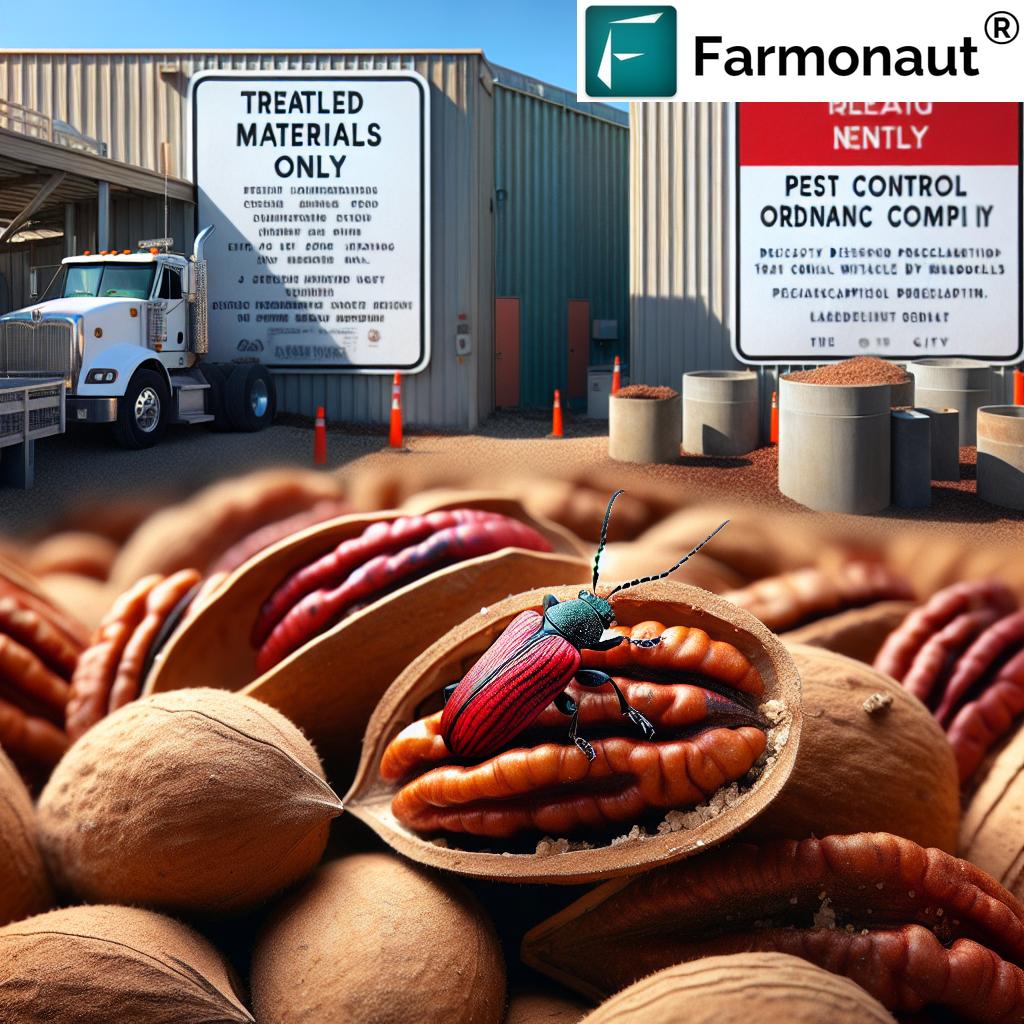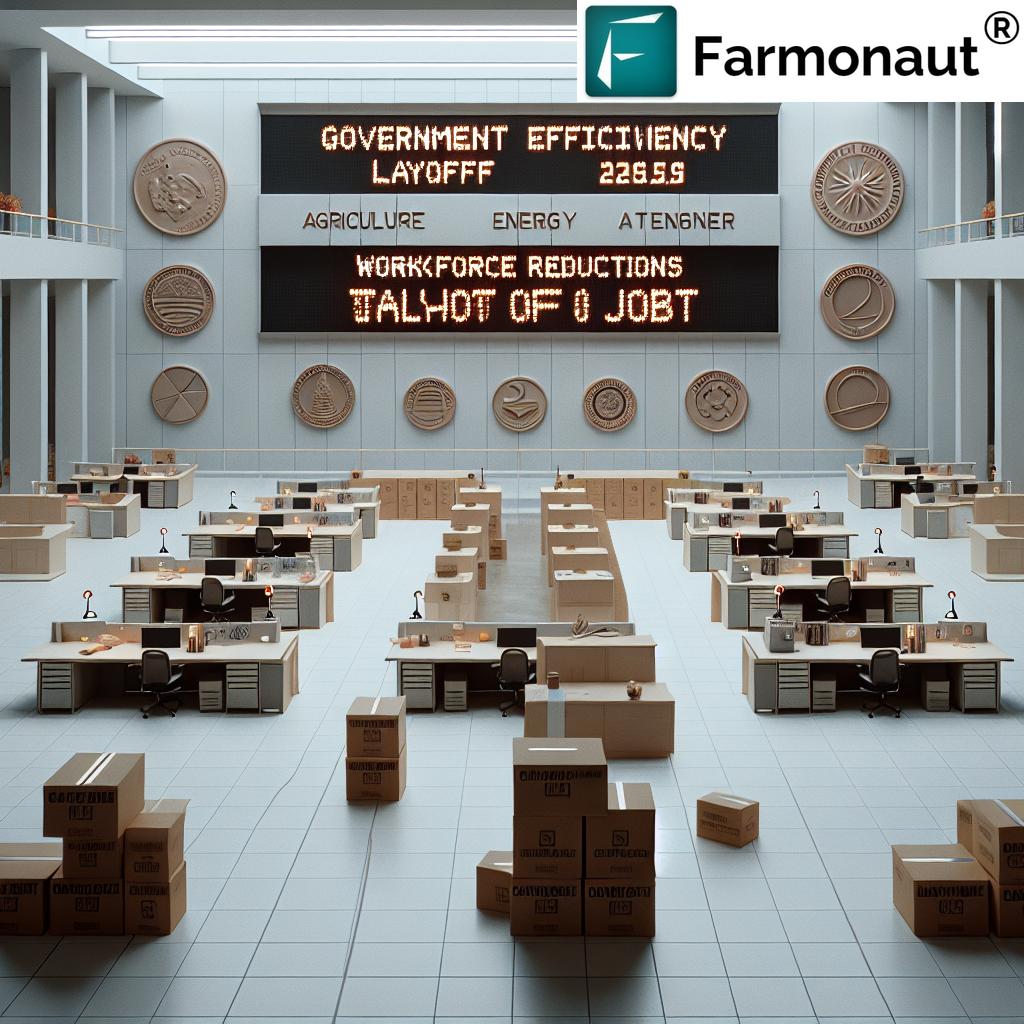El Paso’s New Pest Control Ordinance: Essential Guidelines for Agricultural Byproduct Treatment and Disposal
“Socorro’s new ordinance imposes fines up to $500 per offense for non-compliance with agricultural byproduct treatment regulations.”
As representatives of Farmonaut, we are deeply committed to advancing sustainable agricultural practices and promoting effective pest control measures. The recent implementation of a new pest control ordinance in Socorro, Texas, has caught our attention, and we believe it’s crucial to shed light on its implications for the agricultural community and residents of El Paso County.
In this comprehensive analysis, we’ll delve into the intricacies of the new agricultural byproduct regulations, explore the reasons behind their implementation, and provide valuable insights on how to comply with these new guidelines effectively. Our goal is to help farmers, gardeners, and landscapers navigate these changes while maintaining productive and pest-free environments.
Understanding the New Pest Control Ordinance
The City of Socorro, Texas, has recently enacted a groundbreaking ordinance aimed at regulating the handling and disposal of untreated agricultural byproducts. This legislation comes in response to growing concerns about pest infestations, particularly the red beetle, which has caused significant damage to local agriculture in recent years.
At its core, the ordinance focuses on the treatment of organic materials commonly used in landscaping and gardening, with a particular emphasis on pecan shells and similar byproducts. The primary objective is to prevent these materials from becoming breeding grounds for pests, thereby safeguarding both agricultural interests and public health.
Key Components of the Ordinance
Let’s break down the essential elements of this new city ordinance for pest control:
- Mandatory Treatment: All organic products intended for ground use, including pecan shells and almond hulls, must undergo proper treatment to eliminate the risk of pest infestation.
- Documentation Requirements: Individuals and businesses using these materials must maintain detailed records proving that the byproducts have been treated according to city guidelines.
- Penalties for Non-Compliance: Violations of the ordinance are classified as Class C misdemeanors, with fines reaching up to $500 per offense.
- Continuous Enforcement: Each day of non-compliance is considered a separate offense, emphasizing the importance of ongoing adherence to the regulations.
- City Authority: Socorro officials reserve the right to mandate immediate removal or treatment of untreated byproducts at the owner’s expense.
These regulations underscore the city’s commitment to proactive pest management and highlight the critical role that proper organic waste management plays in maintaining a healthy agricultural ecosystem.

The Importance of Pecan Shell Treatment for Landscaping
Pecan shells are a popular choice for landscaping in El Paso due to their aesthetic appeal and organic nature. However, untreated shells can pose significant risks:
- Attraction of Pests: Raw pecan shells can attract various pests, including the dreaded red beetle.
- Moisture Retention: Untreated shells may retain excess moisture, creating an ideal environment for fungal growth and pest proliferation.
- Nutrient Imbalance: Decomposing untreated shells can alter soil pH and nutrient composition, potentially harming plants.
To address these issues, the ordinance mandates specific pecan shell treatment for landscaping. This typically involves processes such as composting, heat treatment, or chemical sterilization to eliminate potential pest habitats while preserving the beneficial properties of the shells.
At Farmonaut, we understand the importance of balancing agricultural practices with environmental concerns. Our satellite-based crop health monitoring services can help farmers and landscapers identify potential pest hotspots and optimize their treatment strategies. Learn more about our services at Farmonaut Web App.
Guidelines for Organic Material Treatment
The Socorro ordinance provides specific guidelines for the treatment of organic materials to prevent pest infestations. Here’s an overview of the recommended practices:
- Heat Treatment: Exposing materials to high temperatures (typically above 140°F) for a specified duration to eliminate pests and their eggs.
- Composting: Properly managed composting can generate heat and beneficial microorganisms that naturally deter pests.
- Chemical Treatment: Application of approved, environmentally-friendly pesticides or sterilants under controlled conditions.
- Fumigation: In some cases, fumigation with approved gases may be necessary for large-scale treatment.
- Dehydration: Reducing moisture content to levels inhospitable to pests through controlled drying processes.
It’s crucial to note that the specific treatment method may vary depending on the type of organic material and its intended use. Always consult with local agricultural extension offices or pest control professionals to ensure compliance with the ordinance.
“The pest control ordinance in Socorro, Texas, specifically targets red beetle infestations through mandated treatment of pecan shells.”
Implementing Effective Organic Waste Management
Proper organic waste management is at the heart of the new ordinance. Here are some best practices for businesses and individuals to ensure compliance:
- Source Separation: Segregate different types of organic waste to facilitate appropriate treatment methods.
- On-Site Treatment: Invest in equipment or facilities for on-site treatment, such as composting bins or heat treatment chambers.
- Professional Services: Partner with certified waste management companies specializing in agricultural byproduct treatment.
- Record Keeping: Maintain detailed logs of all treatment processes, including dates, methods used, and quantities treated.
- Regular Inspections: Conduct routine checks of stored materials to ensure they remain pest-free post-treatment.
- Employee Training: Educate staff on proper handling and treatment protocols to ensure consistent compliance.
By implementing these practices, businesses and individuals can not only comply with the ordinance but also contribute to a healthier, pest-resistant environment in Socorro and the greater El Paso area.

Red Beetle Infestation Prevention: A Priority
The red beetle infestation prevention is a primary focus of the new ordinance. These pests can cause extensive damage to crops and gardens, making proactive measures essential. Here are some strategies to complement the mandated treatment methods:
- Crop Rotation: Regularly changing crop types can disrupt pest life cycles and reduce infestation risks.
- Natural Predators: Encourage beneficial insects that prey on red beetles to maintain a natural balance.
- Barrier Methods: Use physical barriers like row covers to protect vulnerable plants.
- Monitoring: Regularly inspect crops and landscaped areas for early signs of infestation.
- Prompt Removal: Quickly remove and properly dispose of any infested materials to prevent spread.
At Farmonaut, our satellite-based crop monitoring services can help detect early signs of pest infestation, allowing for timely intervention. Explore our technology at Farmonaut Mobile App.
Understanding the Risks of Untreated Agricultural Materials
The new ordinance emphasizes the potential dangers associated with untreated agricultural materials. These risks extend beyond pest infestations and can have far-reaching consequences for both agriculture and public health:
- Disease Transmission: Untreated organic waste can harbor pathogens that may spread to crops, livestock, or even humans.
- Soil Contamination: Improper disposal can lead to soil pollution, affecting future crop yields and ecosystem health.
- Water Pollution: Runoff from untreated agricultural byproducts can contaminate water sources, impacting both wildlife and human communities.
- Odor Issues: Decomposing untreated organic matter can create unpleasant odors, affecting quality of life in nearby areas.
- Invasive Species: Untreated materials may contain seeds or spores of invasive plants, potentially disrupting local ecosystems.
By mandating proper treatment and disposal, the Socorro ordinance aims to mitigate these risks and protect the community’s environmental and economic interests.
Pest Prevention in Gardening: Best Practices
Pest prevention in gardening is a crucial aspect of the new ordinance, but it’s also a fundamental principle of sustainable agriculture. Here are some best practices that align with the ordinance’s goals:
- Soil Health: Maintain balanced, nutrient-rich soil to promote strong plant growth and natural pest resistance.
- Companion Planting: Strategically pair plants that naturally repel pests or attract beneficial insects.
- Water Management: Proper irrigation techniques can prevent waterlogging and reduce pest-friendly environments.
- Mulching: Use treated, pest-free mulch to suppress weeds and maintain soil moisture.
- Regular Pruning: Remove dead or diseased plant material promptly to prevent pest habitation.
- Natural Pesticides: When necessary, opt for organic pest control solutions that comply with local regulations.
Implementing these practices not only helps comply with the ordinance but also promotes overall garden health and productivity.
For more insights on sustainable farming practices and pest management, check out Farmonaut’s resources at Farmonaut API.
Compliance and Documentation: Navigating the New Requirements
The Socorro ordinance places significant emphasis on proper documentation and compliance. Here’s what businesses and individuals need to know:
- Treatment Records: Maintain detailed logs of all treatment processes, including dates, methods, and quantities.
- Source Documentation: Keep records of where agricultural byproducts were obtained, including supplier information.
- Inspection Reports: Document regular inspections of treated materials to ensure ongoing compliance.
- Employee Training Logs: Keep records of staff training on proper handling and treatment procedures.
- Disposal Documentation: Maintain receipts or records of proper disposal for any untreatable materials.
These records must be readily available for review by city officials upon request. Proper documentation not only ensures compliance but also helps businesses track their pest prevention efforts over time.
Agricultural Byproduct Treatment Guidelines for Pest Control
| Agricultural Byproduct | Required Treatment Method | Documentation Required | Penalty for Non-Compliance |
|---|---|---|---|
| Pecan Shells | Heat treatment at 140°F for 30 minutes or composting for 3 months | Treatment log, temperature records, composting timeline | Up to $500 per offense |
| Tree Trimmings | Chipping and composting for 2 months | Chipping records, composting timeline | Up to $500 per offense |
| Almond Hulls | Fumigation or heat treatment at 135°F for 60 minutes | Fumigation certificates or heat treatment logs | Up to $500 per offense |
| Grass Clippings | Composting for 1 month or heat treatment at 131°F for 3 days | Composting timeline or heat treatment records | Up to $500 per offense |
| Fruit Waste | Anaerobic digestion or composting for 2 months | Digestion process logs or composting timeline | Up to $500 per offense |
The Role of Technology in Pest Control and Compliance
As we navigate these new regulations, technology plays a crucial role in both pest control and ensuring compliance. At Farmonaut, we offer cutting-edge solutions that can assist farmers and businesses in meeting these new requirements:
- Satellite-Based Monitoring: Our advanced satellite imagery can help detect early signs of pest infestation, allowing for proactive treatment.
- AI-Powered Advisory: Our Jeevn AI system provides personalized recommendations for pest management based on real-time data.
- Blockchain Traceability: Our blockchain solutions can help maintain transparent and tamper-proof records of treatment processes.
- Resource Management Tools: Our platform offers tools to optimize resource allocation, including pest control measures.
To learn more about how Farmonaut’s technology can support your pest control efforts and ordinance compliance, visit our API Developer Docs.
Economic Implications of the New Ordinance
While the primary goal of the Socorro ordinance is to prevent pest infestations and protect public health, it’s important to consider its economic implications:
- Initial Costs: Businesses may need to invest in new equipment or facilities for proper treatment and documentation.
- Operational Changes: Adapting to new treatment processes may require adjustments to existing workflows and supply chains.
- Potential Savings: In the long term, effective pest prevention can lead to reduced crop losses and lower pesticide costs.
- Market Opportunities: Compliant businesses may gain a competitive edge in markets that value sustainable and pest-free products.
- Job Creation: The new regulations may create opportunities in pest control, waste management, and compliance consulting sectors.
While there may be short-term challenges, the long-term benefits of improved pest control and environmental stewardship are likely to outweigh the initial costs.
Community Engagement and Education
The success of the new pest control ordinance relies heavily on community engagement and education. Here are some ways the City of Socorro and local organizations can promote awareness and compliance:
- Public Workshops: Organize informational sessions to explain the ordinance and its implications.
- Demonstration Projects: Set up model gardens or farms showcasing proper treatment and pest prevention techniques.
- School Programs: Integrate pest control and sustainable agriculture topics into local school curricula.
- Community Composting: Establish community composting sites to facilitate proper organic waste treatment.
- Multilingual Resources: Provide educational materials in multiple languages to ensure widespread understanding.
By fostering a culture of awareness and shared responsibility, Socorro can maximize the effectiveness of its pest control efforts.
Looking Ahead: The Future of Pest Control in El Paso County
The Socorro ordinance represents a significant step forward in pest control and agricultural byproduct management. As we look to the future, several trends and considerations emerge:
- Technological Advancements: Continued innovations in pest detection and treatment technologies may further refine control methods.
- Climate Considerations: Changing climate patterns may influence pest behaviors, requiring adaptive management strategies.
- Regional Cooperation: Neighboring municipalities may adopt similar ordinances, creating a more unified approach to pest control.
- Sustainable Agriculture: The focus on pest prevention aligns with broader trends towards sustainable and regenerative farming practices.
- Biodiversity Protection: Future regulations may place greater emphasis on preserving beneficial insects and natural pest predators.
As these trends evolve, Farmonaut remains committed to providing cutting-edge solutions that support sustainable agriculture and effective pest management. Explore our services on our Android App or iOS App.
Frequently Asked Questions (FAQ)
- Q: Who does the new pest control ordinance apply to?
A: The ordinance applies to all individuals and businesses in Socorro, Texas, who handle or use agricultural byproducts for landscaping, gardening, or other purposes. - Q: What types of materials require treatment under the new ordinance?
A: The ordinance primarily focuses on organic materials like pecan shells, almond hulls, and other agricultural byproducts commonly used in landscaping and gardening. - Q: How can I prove that my materials have been properly treated?
A: You must maintain detailed documentation of the treatment process, including dates, methods used, and quantities treated. This documentation should be readily available for inspection by city officials. - Q: What are the penalties for non-compliance with the ordinance?
A: Violations are classified as Class C misdemeanors, with fines up to $500 per offense. Each day of non-compliance is considered a separate offense. - Q: Can I treat the materials myself, or do I need to use a professional service?
A: You can treat materials yourself if you have the proper equipment and follow the city’s guidelines. However, many businesses may find it more efficient to use professional treatment services.
Conclusion
The new pest control ordinance in Socorro, Texas, represents a significant step towards protecting local agriculture and public health. By mandating proper treatment of agricultural byproducts and implementing strict documentation requirements, the city aims to prevent pest infestations and promote sustainable practices.
As we’ve explored in this comprehensive guide, compliance with the ordinance involves understanding treatment methods, maintaining proper documentation, and adopting best practices in organic waste management. While these new regulations may present initial challenges, they ultimately contribute to a healthier, more resilient agricultural ecosystem.
At Farmonaut, we’re committed to supporting farmers, gardeners, and businesses in navigating these new requirements. Our advanced satellite monitoring and AI-powered advisory services can provide valuable insights for pest prevention and crop management. We encourage all stakeholders to stay informed, engage with local resources, and leverage technology to ensure compliance and promote sustainable agriculture.
Remember, effective pest control is not just about meeting regulatory requirements—it’s about fostering a healthier environment for our communities and future generations. By working together and embracing innovative solutions, we can create a pest-resistant, thriving agricultural landscape in Socorro and beyond.
Earn With Farmonaut: Affiliate Program
Earn 20% recurring commission with Farmonaut’s affiliate program by sharing your promo code and helping farmers save 10%. Onboard 10 Elite farmers monthly to earn a minimum of $148,000 annually—start now and grow your income!
Farmonaut Subscriptions
Stay updated with the latest in agricultural technology and pest control strategies by following Farmonaut on our social media channels and downloading our mobile apps:
Together, we can create a more sustainable and pest-resistant future for agriculture in El Paso County and beyond.
















